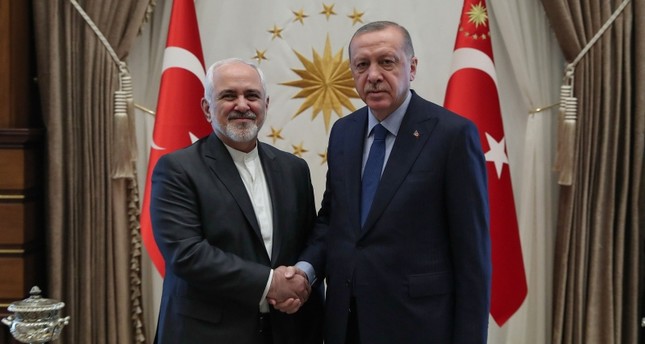Iranian Foreign Minister Mohammad Javad Zarif with Turkish President Recep Tayyip Erdoğan, April 17, 2019
Iranian Foreign Minister Mohammad Javad Zarif, a day after seeing Bashir al-Assad, has visited Turkish leaders — but given away little about the political and economic maneuvers over Syria.
Zarif saw both President Recep Tayyip Erdoğan, for just over an hour, and Foreign Minister Mevlüt Çavuşoğlu on Wednesday.
Significantly, there was no statement on the opposition-held northwest, which the Assad regime wants to overrun but where Turkish forces are alongside rebels.
The regime has stepped up shelling of Idlib and northern Hama Provinces, breaking a Russian-Turkish “demilitarized zone” declared last September. Hundreds of civilians have been killed or wounded and 10,000s displaced.
Russia has carried out occasional airstrikes, on the pretext of attacking “terrorists”, but has not agreed to an offensive to overrun the area. Iran, which has verbally backed the attempt at recapture, has been silent on the issue since the demilitarized zone suspended a Russian-regime campaign.
Instead, Zarif offered words of support for Turkish intentions to push back the Kurdish militia YPG — which Ankara sees as linked to the Turkish Kurdish insurgency PKK — in north and northeast Syria:
We understand the concerns of Turkey about terrorist groups in Syria and we agree with them. The security and peace of the Turkish people are very important to us. We enjoy very thorough cooperation on this issue.
Erdoğan has set out the intention for a 32-km (20-mile) deep “safe zone” across Kurdish territory on the Turkish-Syrian border, but Ankara has held back from military action after US agencies curbed Donald Trump’s declaration in December of a withdrawal of American troops.
The US military created and supports the Kurdish-led Syrian Democratic Forces, which hold 27% of Syria after pushing out the Islamic State.
Erdoğan made no statement and Çavuşoğlu was non-committal:
In Syria, from the start, on the ground, we do not agree with Iran on many issues. But we have decided to cooperate with Iran for a political solution.
Iran, Russia, and Turkey will convene again in the Kazakhstan capital Astana next week. The three countries have declared an “Astana process” since early 2017 to address Syria’s political and military situation.
An Economic Priority?
But Wednesday’s discussions may have focused on economic matters, notably the regime’s tenous position over reconstruction.
Iran has been an essential prop for Assad, providing billions in oil, goods, construction, and lines of credit amid a 75% fall in Syrian GDP and more than $400 billion in damage.
But Tehran is in its own economic difficulties, with long-standing internal issues and the imposition of comprehensive US sanctions from November.
In a sign of a reduction or even cut-off of vital Iranian support, the Syrian people face crippling shortages of petrol, with videos showing miles of queues of parked cars and taxis.
Çavuşoğlu made no reference to the Syrian crisis, but did address Iran’s attempt to push back the American sanctions, including through an escalation of trade with Turkey.
“Our ministers expressed Turkey’s concerns to US counterparts in a recent meeting,” the Foreign Minister said.
He criticized the Trump Administration’s latest step, designating Iran’s Revolutionary Guards as a “foreign terrorist organization”: “This is an extremely wrong decision.”

